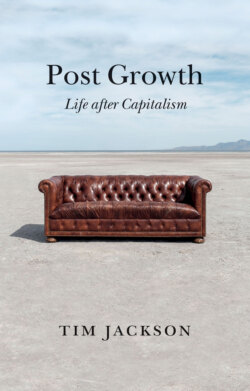Читать книгу Post Growth - Tim Jackson - Страница 26
Dead on arrival?
ОглавлениеThe German economist Wolfgang Streeck is categorical in his prognosis. ‘In my view, it is high time to think again about capitalism as a historical phenomenon,’ he writes in How Will Capitalism End? ‘One that has not just a beginning, but also an end.’ Streeck insists that this ‘end’ isn’t something to which we might one day reluctantly have to look forward. It is already under way. It is happening now. Capitalism is a social system ‘in chronic disrepair’, he claims. A bit like Dennis Quaid’s character in the 1988 film D.O.A. (Dead on Arrival), capitalism may still be talking, and just about walking, but the damage is irreversible. The situation is irredeemably terminal. ‘Nobody believes any more in a moral revival of capitalism,’ Streeck writes.32
If the evidence from Davos is anything to go by, this may not be entirely true. But even as capitalism’s apologists struggle to revive the corpse, their underlying myth appears to be disintegrating. The relentless pursuit of growth has driven us to the verge of ecological collapse, created unprecedented financial fragility and precipitated the terrifying spectre of social instability. Capitalism has no answers to its own failings. It cannot pursue social justice while it continues to prioritize profit. It cannot protect our climate while it continues to idolize the stock market. It finds itself powerless, at the mercy of circumstance, when the lives of millions are at stake. Capitalism’s core belief in eternal growth lies trembling in the ruins. The myth itself is moribund.
A society that allows itself to be steered by a faulty myth risks foundering on the shores of a harsh reality. To cling obstinately to outdated ideas as the world proves them wrong is to court both psychological despair and cultural disaster. But when myths fail, hope itself begins to fade. The role of cultural myth is to furnish us with a sense of meaning and to provide a sense of continuity in our lives. That need is a perennial one. The loss of a sustaining myth undermines our sense of meaning and threatens our collective wellbeing.
Developing new myths, better stories and clearer visions is as essential as understanding the dynamics of collapse. Perhaps more so. That in essence is the task of this book. To look beyond the myth of growth. To dare to see beyond capitalism itself. To revisit its most treasured assumptions. To challenge the truths that have both nourished us and damaged us. To lay the foundations for a different way of seeing and a better way of being. To develop a ‘postgrowth narrative’, a new foundational myth, a more robust vision to guide us into the uncertain future. It is to this task that we now turn.
